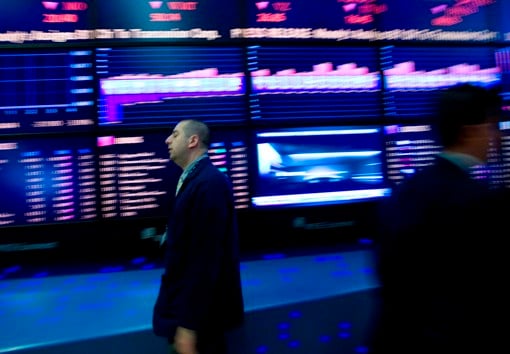Debt markets not flinching, says ING's Doug Cote, a good sign stocks will bounce back; 'buy on the dips'
As worries about European debt drag down global equity markets, the bond markets are not even flinching, which should provide investors with a sense of calm.
“This is a repeat of the ‘much ado about the euro' last year because it looks like contagion to people who don't watch the bond markets,” said Doug Cote, chief market strategist at ING Investment Management.
The S&P 500 was down more than 150 points as of 11:15 a.m. EST, but that represents a buying opportunity only from Mr. Cote's perspective.
The new round of European sovereign-debt downgrades and warnings that were announced Friday, triggering the global equity market nose dives, is not a cause to panic, he said.
“The bond markets are saying this is not news,” he said. “It's prudent to monitor it, but it's not at crisis levels; this, too, shall pass.”
Citing the collapse of Lehman Brothers Holdings Inc. in 2008 as a benchmark for market turmoil, Mr. Cote pointed out that a key measure of implied financial risk remains a long way from crisis mode.
The TED spread, the difference between the interest rates on interbank loans and short-term U.S. government debt, soared to 500 basis points during the Lehman collapse.
But last year, when sovereign-debt issues began sweeping across Europe, the TED spread hovered between 20 and 40 basis points.
Today it is at a ho-hum level of 20 basis points.
Mr. Cote acknowledges reasons to be concerned about sovereign-debt levels in the U.S. and Europe, but he believes that the markets will force politicians to address issues of fiscal austerity.
“As soon as the S&P put the U.S. on a credit watch list, you started hearing politicians talking about austerity,” he said. “We are confident that the politicians will bend at the will of the market. It will be ugly, but we think it gets done.”
In the meantime, Mr. Cote said, investors should focus on the fundamentals and “absolutely buy on the dips.”
Anyone selling out of the current stock market is missing the point of eight consecutive quarters of earnings surprises by the S&P 500, he said.
“Companies are knocking the cover off the ball both on the top and bottom lines,” he said. “Manufacturing is now growing at four times the rate of the economy, and consumer spending is at the highest level ever.”
Accelerating corporate profits, a manufacturing boom, consumer spending levels and the strength of the developing markets all represent momentum behind this stock market, Mr. Cote said.
“You want to be fully invested in this market,” he said.







